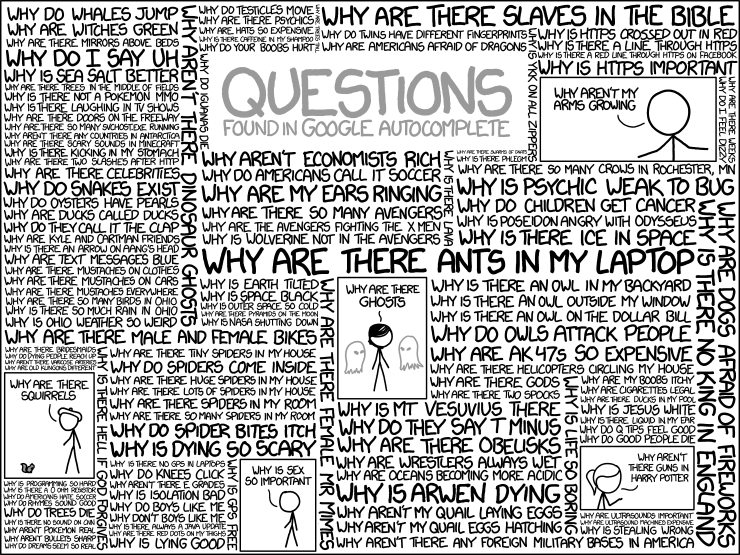I invite you to ask anything you’re wondering about that’s remotely related to effective altruism. There’s no such thing as a question too basic.
Try to ask your first batch of questions by Monday, October 17 (so that people who want to answer questions can know to make some time around then).
Everyone is encouraged to answer (see more on this below). There’s a small prize for questions and answers. [Edit: prize-winning questions and answers are announced here.]
This is a test thread — we might try variations on it later.[1]
How to ask questions
Ask anything you’re wondering about that has anything to do with effective altruism.
More guidelines:
- Try to post each question as a separate "Answer"-style comment on the post.
- There’s no such thing as a question too basic (or too niche!).
- Follow the Forum norms.[2]
I encourage everyone to view asking questions that you think might be “too basic” as a public service; if you’re wondering about something, others might, too.
Example questions
- I’m confused about Bayesianism; does anyone have a good explainer?
- Is everyone in EA a utilitarian?
- Why would we care about neglectedness?
- Why do people work on farmed animal welfare specifically vs just working on animal welfare?
- Is EA an organization?
- How do people justify working on things that will happen in the future when there’s suffering happening today?
- Why do people think that forecasting or prediction markets work? (Or, do they?)
How to answer questions
Anyone can answer questions, and there can (and should) be multiple answers to many of the questions. I encourage you to point people to relevant resources — you don’t have to write everything from scratch!
Norms and guides:
- Be generous and welcoming (no patronizing).
- Honestly share your uncertainty about your answer.
- Feel free to give partial answers or point people to relevant resources if you can’t or don’t have time to give a full answer.
- Don’t represent your answer as an official answer on behalf of effective altruism.
- Keep to the Forum norms.
You should feel free and welcome to vote on the answers (upvote the ones you like!). You can also give answers to questions that already have an answer, or reply to existing answers, especially if you disagree.
The (small) prize
This isn’t a competition, but just to help kick-start this thing (and to celebrate excellent discussion at the end), the Forum team will award $100 each to my 5 favorite questions, and $100 each to my 5 favorite answers (questions posted before Monday, October 17, answers posted before October 24).
I’ll post a comment on this post with the results, and edit the post itself to list the winners. [Edit: prize-winning questions and answers are announced here.]

- ^
Your feedback is very welcome! We’re considering trying out themed versions in the future; e.g. “Ask anything about cause prioritization” or “Ask anything about AI safety.”
We’re hoping this thread will help get clarity and good answers, counter some impostor syndrome that exists in the community (see 1 and 2), potentially rediscover some good resources, and generally make us collectively more willing to ask about things that confuse us.
- ^
If I think something is rude or otherwise norm-breaking, I’ll delete it.

A set of related questions RE: longtermism/neartermism and community building.
1a) What is the ideal theory of change for Effective Altruism as a movement in the next 5-10 years? What exactly does EA look like, in the scenarios that community builders or groups doing EA outreach are aiming for? This may have implications for outreach strategies as well as cause prioritization.[1]
1b) What are the views of various community builders and community building funders in the space on the above? Do funders communicate and collaborate on a shared theory of change, or are there competing views? If so, which organizations best characterize these differences, what are the main cruxes/where are the main sources of tension?
2a) A commonly talked about tension on this forum seems to relate to neartermism versus longtermism, or AI safety versus more publicly friendly cause areas in the global health space. How much of its value is because it's inherently a valuable cause area, and how much of it is because it's intended as an onramp to longtermism/AI safety?
2b) What are the views of folks doing outreach and funders of community builders in EA on the above? If there are different approaches, which organizations best characterize these differences, what are the main cruxes/where are the main sources of tension? I would be particularly interested in responses from people who know what CEA's views are on this, given they explicitly state they are not doing cause-area specific work or research. [2]
3) Are there equivalents [3] of Longview Philanthropy who are EA aligned but do not focus on longtermism? For example, what EA-aligned organization do I contact if I'm a very wealthy individual donor who isn't interested in AI safety/longtermism but is interested in animal welfare and global health? Have there been donors (individual or organizational) who fit this category, and if so, who have they been referred to/how have they been managed?
"Big tent" effective altruism is very important (particularly right now) is one example of a proposed model, but if folks think AI timelines are <10 years away and p(doom) is very high, then they might argue EA should just aggressively recruit for AI safety folks in elite unis.
Under Where we are not focusing: "Cause-specific work (such as community building specifically for effective animal advocacy, AI safety, biosecurity, etc.)"
"designs and executes bespoke giving strategies for major donors"
3. I'm not sure they do as much bespoke advising as Longview, but I'd say GiveWell and Farmed Animal Funders. I think you could contact either one with the amount you're thinking of giving and they could tell you what kind of advising they can provide.